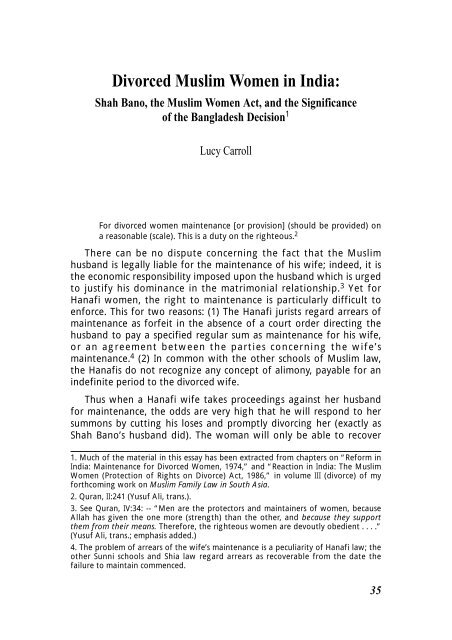Shah-Bano-eng
Shah-Bano-eng
Shah-Bano-eng
You also want an ePaper? Increase the reach of your titles
YUMPU automatically turns print PDFs into web optimized ePapers that Google loves.
Divorced Muslim Women in India:<br />
<strong>Shah</strong> <strong>Bano</strong>, the Muslim Women Act, and the Significance<br />
of the Bangladesh Decision 1<br />
Lucy Carroll<br />
For divorced women maintenance [or provision] (should be provided) on<br />
a reasonable (scale). This is a duty on the righteous. 2<br />
There can be no dispute concerning the fact that the Muslim<br />
husband is legally liable for the maintenance of his wife; indeed, it is<br />
the economic responsibility imposed upon the husband which is urged<br />
to justify his dominance in the matrimonial relationship. 3 Yet for<br />
Hanafi women, the right to maintenance is particularly difficult to<br />
enforce. This for two reasons: (1) The Hanafi jurists regard arrears of<br />
maintenance as forfeit in the absence of a court order directing the<br />
husband to pay a specified regular sum as maintenance for his wife,<br />
or an agreement between the parties concerning the wife’s<br />
maintenance. 4 (2) In common with the other schools of Muslim law,<br />
the Hanafis do not recognize any concept of alimony, payable for an<br />
indefinite period to the divorced wife.<br />
Thus when a Hanafi wife takes proceedings against her husband<br />
for maintenance, the odds are very high that he will respond to her<br />
summons by cutting his loses and promptly divorcing her (exactly as<br />
<strong>Shah</strong> <strong>Bano</strong>’s husband did). The woman will only be able to recover<br />
1. Much of the material in this essay has been extracted from chapters on “Reform in<br />
India: Maintenance for Divorced Women, 1974,” and “Reaction in India: The Muslim<br />
Women (Protection of Rights on Divorce) Act, 1986,” in volume III (divorce) of my<br />
forthcoming work on Muslim Family Law in South Asia.<br />
2. Quran, II:241 (Yusuf Ali, trans.).<br />
3. See Quran, IV:34: -- “Men are the protectors and maintainers of women, because<br />
Allah has given the one more (str<strong>eng</strong>th) than the other, and because they support<br />
them from their means. Therefore, the righteous women are devoutly obedient ....”<br />
(Yusuf Ali, trans.; emphasis added.)<br />
4. The problem of arrears of the wife’s maintenance is a peculiarity of Hanafi law; the<br />
other Sunni schools and Shia law regard arrears as recoverable from the date the<br />
failure to maintain commenced.<br />
35



